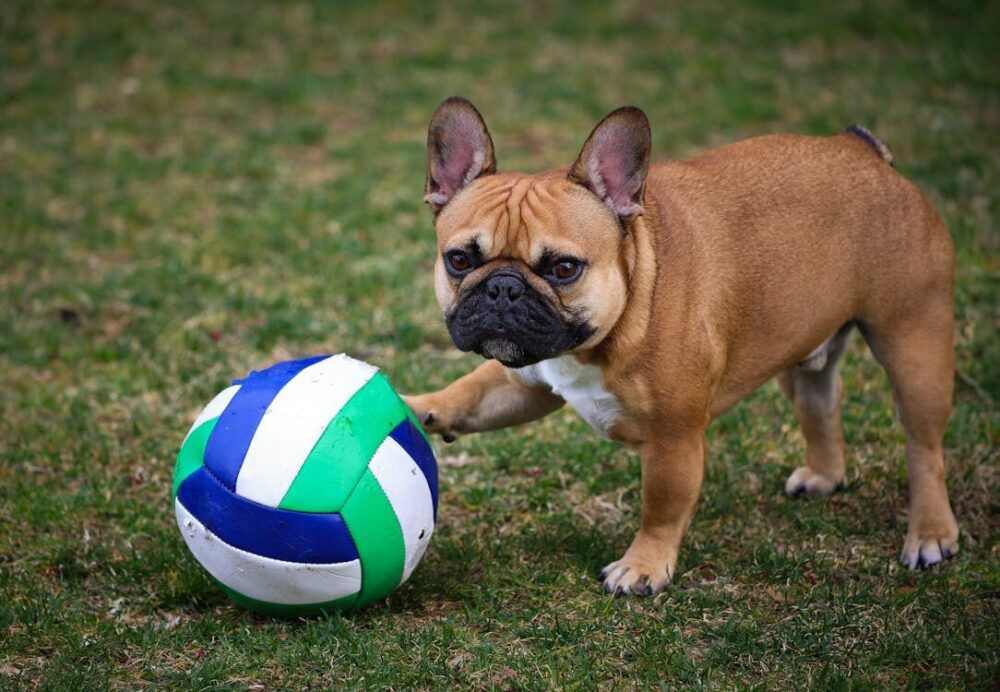Are French Bulldogs Aggressive? All You Need to Know

You’re relaxing on your sofa in the evening, and your Frenchie is curled up beside you, snoring softly. Everything is perfect… until the doorbell rings. Suddenly, they’re barking like a guard dog, and you wonder if your French Bulldog is being their quirky self or if they’re actually aggressive.
The answer lies in understanding this breed’s unique personality. Frenchies are loyal clowns who occasionally overreact, but they’re far from hostile. And like all dogs, they communicate through behavior, so it’s our job to listen.
This guide cuts through the misconceptions about French Bulldogs and explores why some develop problematic behaviors. Whether you’re a concerned Frenchie owner or you’re considering bringing one home, you’ll discover what triggers aggression in French Bulldogs and how to prevent it.
By the end, you’ll see those side-eye glances and playful growls in a whole new light. So, let’s separate Frenchie facts from fiction!
Understanding the French Bulldog Temperament
Most “aggressive” stories about Frenchies stem from simple misunderstandings. First, we have to explore the French Bulldog’s natural temperament, which is shaped by both possible personality traits and the breed’s history.
General Personality Traits
French Bulldogs are naturally affectionate, highly people-oriented, and brimming with playful charm. Unlike breeds that are developed for guarding or hunting, Frenchies were designed to be companions, and it shows in their every interaction. They form strong bonds with their owners, often following their humans from room to room just to stay close.
Their expressive faces and comical antics make them endearing, and their moderate energy level ensures they’re just as happy cuddling on the couch as they are during a short play session. Their funny expressions and love for human attention tend to overshadow any aggressive tendencies.
Most Frenchies thrive in family environments. They’re gentle with children and patient with other pets when properly introduced. However, like all dogs, individual personalities vary. While they may be occasionally stubborn (a common trait in bulldog breeds), this is rarely a sign of true aggression. It’s usually just a bid for attention or a reaction to discomfort.
Early socialization and positive experiences are the key to nurturing their naturally affectionate demeanor, helping reinforce their friendliness and ensuring they grow into well-mannered, confident adults.
Breed History and Influence on Behavior
Originating in 19th-century England as miniature bulldogs, Frenchies were later refined in France as lapdogs for lace workers and urban families. Their breeding focused on companionship, not protection, which explains their low prey drive and adaptability to apartment living.
Selective breeding prioritized traits like loyalty and a calm disposition, though their expressive faces (often mistaken for scowls) can sometimes be misleading. Modern French Bulldogs retain this legacy, making them poor guard dogs but excellent emotional support pets.
A lot of factors play a role in canine aggression, but this breed’s history shows that genetics is not a direct cause: it’s the environment and training that ultimately determine whether a Frenchie develops problematic behaviors or not.
Are French Bulldogs Aggressive by Nature?
When asking if French Bulldogs are aggressive, it’s important we separate fact from fiction. While no breed is ever entirely free of behavioral issues, Frenchies are generally more prone to snoring than snarling. Let’s compare the myths to the reality behind their temperament.
Myth vs. Reality
A common misconception is that French Bulldogs are inherently aggressive because of their bulldog lineage. In reality, modern Frenchies were selectively bred as companion animals, so the territorial instincts seen in their larger ancestors are down to a minimum. What’s often mistaken for aggression is usually playful exuberance, stubbornness, or anxiety, not true hostility.
Another myth is based on their “grumpy” facial expressions. No, those adorable wrinkles and underbites aren’t indicative of a sour mood or a short temper; they’re simply breed traits. Aggression is very rare in French Bulldogs, and it typically stems from external factors like poor training, fear, or health problems rather than natural predisposition.
Responsible breeding and proper socialization reduce aggressive tendencies even further, so French Bulldogs are one of the least aggressive small dog breeds as long as they’re raised correctly.
What Does “Aggression” Really Mean in Dogs?
Aggression in dogs is a complex survival behavior that’s rooted in self-preservation, not a sign of a “bad” dog. It manifests as a range of different warning or defensive actions (from stiffening and growling to snapping or biting), and they are triggered when a dog perceives a threat. These responses are driven by underlying emotions like fear, frustration, or pain, and it’s how dogs communicate when they feel cornered or overwhelmed.
Unlike dominance (which is often misinterpreted), aggression reflects anxiety or learned helplessness, so it’s where the dog believes confrontation is its only option. Even in mild cases, aggressive behaviors are the dog’s attempt to create distance from perceived danger, whether that’s an unfamiliar person, another animal, or an uncomfortable situation.
This spectrum of aggressive behaviors can be easily misinterpreted in French Bulldogs. Protective instincts (like alert barking) are often confused with aggression, but they’re actually signs that a dog is engaged with its environment. Similarly, resource guarding (like growling over food or toys) is a survival behavior, not necessarily a personality flaw.
Understanding these differences helps owners address the root cause instead of labeling their Frenchie as aggressive. With patience, attention, and proper care, most concerning behaviors can be successfully managed so that French Bulldogs become amiable companions as they grow up.

Paws that will patter beside you, a heart that will adore you. Your French Bulldog soulmate is waiting in our puppy gallery!
Causes of Aggressive Behavior in French Bulldogs
While French Bulldogs are beloved for their affectionate nature, certain situations can lead to uncharacteristic aggressive responses. Unlike breeds with strong guarding instincts, a Frenchie’s aggression almost always comes from external triggers or unmet needs. Let’s identify some underlying causes to help owners address behavioral issues at the source:
Lack of Socialization
French Bulldogs exposed to limited people, animals, or environments during their critical socialization period (8-16 weeks) may react fearfully to new experiences later in life. A poorly socialized Frenchie might perceive harmless situations (like meeting strangers) as threats, leading to defensive aggression. Regular positive exposure helps them build confidence.
In Kingdom Frenchies, we understand the importance of introducing puppies to other dogs, people, and environments; hence, we stimulate and socialize each of our Frenchie pups from the moment they are born until they find their forever home, ensuring that they will grow to be meek, confident adults.
Poor Training or No Boundaries
Inconsistent rules or permissive handling can encourage pushy behaviors that escalate over time. For example, a Frenchie allowed to demand-bark for food may progress to resource guarding. Clear, reward-based training establishes respectful communication with your dog.
Fear, Anxiety, or Stress
Frenchies are sensitive dogs who may react aggressively when frightened by loud noises, rough handling, or chaotic environments. Their compact size makes them vulnerable, so they sometimes preemptively growl or snap to avoid perceived danger.
Health-Related Causes
Pain is a major aggression trigger. Frenchies with hip dysplasia, ear infections, or brachycephalic discomfort may lash out when touched. Even minor irritations like allergies can cause irritability. Regular vet checkups are crucial for their well-being.
Resource Guarding
Some Frenchies develop possessive behaviors over food, toys, or sleeping areas. This stems from instinct, not malice. Manage this by trading up (offering higher-value items) and teaching “drop it” cues since they are pups and eager to learn.
Signs of Aggression in French Bulldogs
Recognizing when a French Bulldog might get aggressive requires understanding their body language: a growl isn’t always a threat, and a wagging tail doesn’t always mean happiness. Early intervention starts with spotting their subtle cues before they escalate. Here are the warning signs and more serious behaviors that need your attention.
Early Warning Signs
French Bulldogs typically give clear signals before any aggression escalates. Growling is the most obvious vocal warning, often accompanied by a wrinkled muzzle or tense facial expressions. Baring teeth (without snapping) and a stiff, frozen body posture indicate discomfort, while whale eye (showing the whites of their eyes) or pinned-back ears suggest anxiety.
These signs are your Frenchie’s way of saying, “I’m uneasy, give me space.” Ignoring these cues may force them to escalate. Context matters too, since a playful growl during tug-of-war is different from a low, sustained growl from contact while eating.
Escalated Behavior
When their early warnings go unheeded, Frenchies may progress to lunging, snapping, or biting, though serious attacks are extremely rare in this breed. Lunging is often a bluff charge (no contact), while snapping is a controlled warning bite that stops short of skin.
Actual biting usually occurs only if the dog feels trapped or is in pain. These behaviors are most common in Frenchies with poor socialization, fear-based trauma, or untreated pain. Immediate redirection (like offering a toy) and avoiding punishment are the tricks to de-escalation.
How to Prevent Aggression in French Bulldogs
Preventing French Bulldogs from becoming aggressive starts with proactive care and thoughtful training. By addressing their needs early on and consistently, you can nurture their naturally friendly temperament. Here are five key strategies to help your Frenchie thrive:
#1. Early and Consistent Socialization
The prime socialization period for puppies is 8-16 weeks. During this time, expose your Frenchie to various people, dogs, sounds, and environments. Positive experiences at this stage create a confident adult dog that’s less likely to react fearfully. Keep interactions pleasant and reward their calm behavior.
#2. Positive Reinforcement Training
French Bulldogs thrive on reward-based training. Use small treats, verbal praise, and affection to reinforce good behavior immediately. Focus on teaching basic obedience commands first. Never use punishment – it damages trust and may increase defensive reactions. Short, frequent sessions work best for their attention span.
#3. Meeting Physical and Mental Needs
While they’re not high-energy dogs, Frenchies require daily exercise and mental stimulation. A 20-30 minute walk plus playtime prevents restlessness. Rotate interactive toys to combat any boredom. Food puzzles and hide-and-seek games are a great way to engage their problem-solving skills in positive ways.
#4. Setting Clear Boundaries
Establish consistent rules for your Frenchie from day one. Decide what behaviors are allowed (e.g., furniture privileges, no begging at the table) and stick to them. Make sure all your family members follow the same guidelines to avoid confusing the dog. Use positive redirection for unwanted behaviors instead of scolding them when they overstep.
#5. Regular Veterinary Check-Ups
Schedule annual wellness exams and address any health concerns ahead of time. Frenchies are prone to conditions like skin allergies, ear infections, and joint problems, which can all cause pain-related irritability. Be proactive with parasite prevention and discuss any behavior changes with your vet immediately.

Home isn’t complete until tiny paws patter through it. Find your missing companion in our gallery of French Bulldog puppies!
How to Manage Aggressive Behavior if It Appears
Even with prevention, some French Bulldogs develop aggressive behavior. When this happens, a thoughtful response can prevent escalation and improve behavior. These proven strategies will help you address the issue safely and effectively:
Stay Calm and Avoid Punishments
Harsh discipline, like yelling or physical correction, worsens aggression in French Bulldogs. These sensitive dogs may perceive punishment as a threat, which may trigger more defensive behavior.
Instead, keep your cool and remove your dog from stressful situations. Reward calm behavior with treats and praise to reinforce positive associations. Never punish growling – it’ll suppress important warning signals and may lead to unannounced biting in the future.
Identify the Trigger
Carefully observe when and where aggressive reactions happen. Common triggers include approaching your Frenchie while they’re eating, handling sensitive areas, or encountering specific people or animals.
Keep a log to detect patterns and note the environment, time of day, and your dog’s body language. Identifying triggers allows you to either avoid them or gradually acclimate your Frenchie through controlled exposure.
Behavior Modification Techniques
Desensitization involves exposing your Frenchie to triggers at a low intensity that doesn’t provoke aggression, then gradually increasing exposure. Pair this with counterconditioning by offering them high-value treats to create positive associations.
For example, if your dog reacts poorly to strangers, reward calm behavior at increasing distances before attempting introductions. Always work below their reaction threshold to make gradual progress.
Professional Help
Seek out a certified dog trainer or veterinary behaviorist if aggression escalates or poses safety risks. Professionals can assess whether the behavior stems from fear, pain, or other causes, then create a tailored plan.
Medication may be recommended for anxiety-related cases. In any case, early intervention leads to better outcomes, so don’t wait until biting occurs.
Are French Bulldogs Good with Kids and Other Pets?
A common concern for potential owners is whether French Bulldogs are aggressive toward children or other animals.
Generally, their affectionate nature makes them excellent companions, but proper introductions and supervision are always necessary. Understanding their temperament helps keep the peace in multi-pet and family households.
Around Children
French Bulldogs typically adore children and thrive in family environments, thanks to their patient and playful disposition. Their sturdy build allows them to handle gentle play, but their small size prevents them from accidentally knocking over toddlers. For safe interactions:
– Teach children to avoid disturbing a sleeping or eating Frenchie
– Supervise play to prevent tail or ear pulling
– Involve kids in positive training activities (like treat rewards)
Most Frenchies form protective bonds with “their” children, though early socialization helps them adapt to noisy household energy. Always monitor interactions with very young kids, as Frenchies may react defensively to sudden movements.
Around Other Dogs and Animals
With proper introductions, French Bulldogs usually coexist peacefully with other pets. They tend to get along well with cats if raised together (though some may chase) and enjoy other canine companions, but they may be picky about their playmates.
Some compatibility factors include:
– The other pet’s temperament (avoid high-energy/hyper dogs)
– Your Frenchie’s socialization history
– Resource management (separate feeding areas)
While rare, same-sex aggression can occur in unneutered males. In general, the truth is that most Frenchies prefer human attention over interactions with other animals.
Frequently Asked Questions
Are French Bulldogs more aggressive than other breeds?
No, they are not. French Bulldogs rank among the least aggressive breeds according to temperament studies. Their companion-focused breeding makes them more prone to seeking attention than confrontation. However, individual personality and upbringing play significant roles.
Can a French Bulldog become aggressive with age?
Yes, a French Bulldog can become aggressive if underlying issues aren’t addressed. Senior Frenchies may show irritability due to pain (arthritis), cognitive decline, or sensory loss. Regular vet checkups can help identify and address these causes early.
How do I stop my French Bulldog from growling?
You should never punish growling in your Frenchie since it’s a warning signal. Instead, identify and remove the trigger, then reward calm behavior. Consult a trainer if their growling escalates over time.
Are male French Bulldogs more aggressive than females?
Unneutered males may show more territorial behaviors, but neutering minimizes differences. Individual temperament and socialization always matter more than your dog’s sex.
Can neutering or spaying reduce aggression in French Bulldogs?
Yes, neutering can reduce aggression, particularly for hormone-driven behaviors like territorial marking or same-sex rivalry. However, it won’t resolve aggression stemming from fear or poor training.
Key Takeaways
– French Bulldogs are not naturally aggressive. Their breeding as companion animals makes them one of the least aggressive small dog breeds available.
– Aggression is usually triggered by external factors. Common causes include fear, pain, poor socialization, or lack of training, not something inherent in the Frenchies’ temperament.
– Early warning signs matter. Growling, stiff posture, or whale eye signal discomfort. Never punish these warnings; address the root cause instead.
– Prevention is highly effective. Proper socialization, positive training, routine vet care, and meeting their needs prevent most behavioral issues.
– They’re generally great with families. Frenchies thrive with children and other pets when introduced properly, though early supervision is advised.
– Professional help works. If aggression appears, consult a certified trainer or vet behaviorist early instead of waiting for an escalation.
– Neutering/spaying can help. It reduces hormone-driven behaviors, but it won’t fix fear-based aggression.
– Context is important. What looks like aggression may actually be playfulness, stress, or pain, so always assess the full situation.

